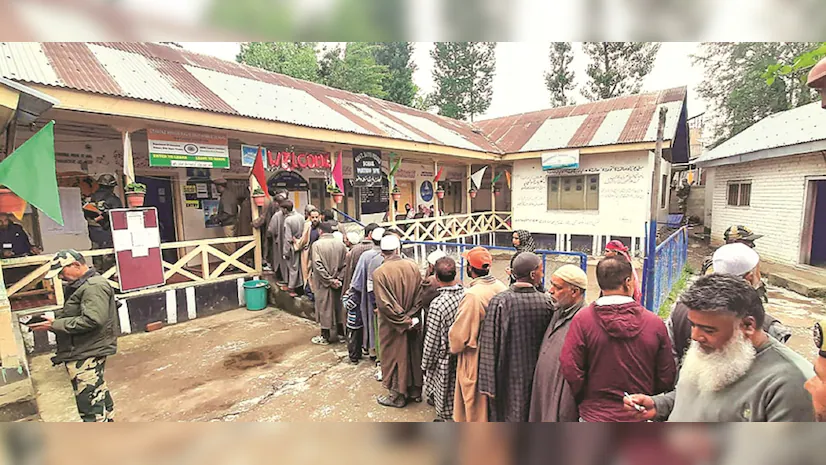
Table of Contents
Jammu and Kashmir Polls Phase 3 LIVE Updates: Over 20,000 Polling Staff Mobilized; Voting Begins at 7 AM
The electoral process in Jammu and Kashmir entered a significant phase with the commencement of Phase 3 of polling. As the polls are conducted to elect representatives in various constituencies across the Union Territory (UT), this phase stands as a crucial milestone in the democratic process, especially after Jammu and Kashmir’s reorganization into a UT following the abrogation of Article 370. Here is a detailed overview of the ongoing Phase 3 elections:
1. Massive Deployment of Polling Staff
The Election Commission has mobilized over 20,000 polling staff to ensure a smooth, secure, and transparent voting process. The staff members have been assigned to various polling stations scattered across the region, including remote areas. They are supported by local authorities and the security forces to oversee the smooth functioning of the electoral process. All polling staff underwent rigorous training to manage the polling process effectively.
Many polling stations, especially those located in difficult terrains, have been equipped with special provisions to ensure easy accessibility for voters. The staff includes presiding officers, polling officers, and micro-observers tasked with maintaining transparency and handling any potential concerns during the voting process.
2. Voting Begins at 7 AM
As the dawn broke, polling stations opened their doors to voters at 7 a.m., marking the start of a day-long process of casting ballots. Long queues of voters could be seen forming outside the stations early in the morning, reflecting the enthusiasm and eagerness of the electorate. The polls are scheduled to continue until the evening, and voters have been urged to come out in large numbers to participate in this democratic exercise.
The Election Commission has set up various checkposts, help desks, and guidance centers to assist voters, especially the elderly and differently-abled, to exercise their right without facing difficulties. Voter turnout is expected to be substantial as people from all age groups and demographics are participating in the voting process.
3. Security Measures in Place
Given the region’s complex security environment, authorities have made extensive security arrangements to ensure the safety of voters and polling staff. A multi-tier security setup has been put in place, with paramilitary forces, local police, and army personnel working together to guard polling stations. Drone surveillance, mobile security units, and quick response teams (QRTs) are on standby to address any emerging threats or untoward incidents.
Many voters expressed confidence in the security measures, mentioning that the strong security presence gave them a sense of safety while coming out to vote.
4. Key Constituencies and Political Contests
Several high-profile constituencies are witnessing intense political battles in Phase 3. Both national and regional political parties are fielding candidates to gain an edge in this significant phase. The National Conference (NC), Peoples Democratic Party (PDP), Bharatiya Janata Party (BJP), and Congress are among the main contenders. This phase is critical for several heavyweight candidates who aim to secure a spot in the Jammu and Kashmir Legislative Assembly.
The election results in this phase will significantly influence the overall outcome of the Jammu and Kashmir polls and could potentially reshape the region’s political landscape.
5. Voter Sentiment and Participation
The elections are taking place against a backdrop of hopes, concerns, and aspirations. For many voters, these elections represent a new chapter in Jammu and Kashmir’s political journey following the reorganization of the state into a Union Territory. Issues such as development, employment, education, healthcare, and security remain at the forefront of voters’ minds.
Despite challenges, there is a palpable sense of optimism, with many citizens eager to shape the future of their region through the democratic process. Local leaders and political analysts have emphasized the importance of these elections in determining the next steps for the Union Territory’s governance and development.
6. Special Provisions for Voters
Authorities have made special provisions for senior citizens, women, and differently-abled voters to ensure their easy access to polling stations. Designated queues, ramp facilities, and priority voting have been put in place to accommodate these groups, encouraging their active participation in the elections.
In addition, the Election Commission has facilitated postal voting for government employees and other eligible categories who may be on duty during the voting hours.
Conclusion
Phase 3 of the Jammu and Kashmir elections is shaping up to be a pivotal moment in the region’s political timeline. With over 20,000 polling staff mobilized and robust security measures implemented, the Election Commission is ensuring a free and fair voting process. As voters flock to polling stations, the electoral process continues to uphold the principles of democracy, giving the people of Jammu and Kashmir the opportunity to voice their choices and contribute to the future of their region.
These elections are not just about the numbers—they represent the aspirations of millions seeking a prosperous and peaceful future. The results will provide a clearer picture of the political direction Jammu and Kashmir will take in the coming years.
